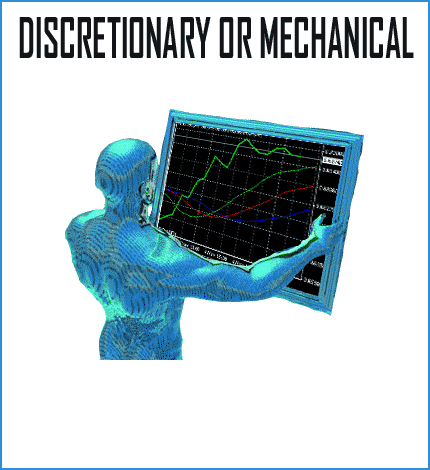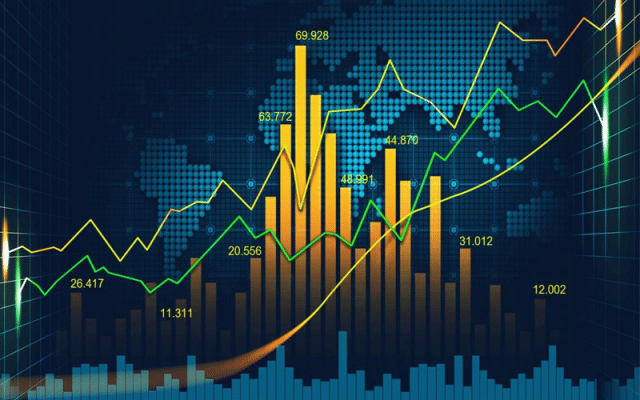In Forex trading, traders usually fall into two broad categories – mechanical traders and discretionary traders. While the former is rule-based trading, the latter is decision-based trading. In this article, we take a look at what they are in-depth and find out which is the better of the two.
Discretionary Trading or Mechanical Trading System
First, let’s talk about discretionary trading. In this form, the trader decides which trade to make based on the information available to him/her. Although discretionary traders should follow a set trading plan that has clear trading rules, they still use discretion in managing the trade.
On the other hand, we have the mechanical trading system in which the decision of making a trade is entirely based on a particular trading system. All decisions based on system trading are absolute and do not take into account the discretion of the trader to make a trade.
Mechanical trading utilizes the set signals for buying and selling and as long as the trade meets the criteria, it should be taken. However, you should test the system beforehand to ensure that it works before you trade with it.
As you can tell, the main difference between these two trading systems is the amount of trader discretion in making trades. Mechanical trading systems follow strict rules and traders using this system should be able to tell what are its benefits and flaws. While in discretionary trading, traders may want to exercise their authority in making decisions above and beyond what the technical factors tell.
Two Trading Approaches: Pros and Cons

Now, let us look at the advantages and disadvantages of both forms of trading. Through analysis, traders will be better able to understand which one to pick for forex trading.
Discretionary Trading Pros
The main advantage of this form of trading is that it allows traders to adapt to current market conditions. A trader may have an amazing trading system but if s/he knows that it fails under certain market conditions, then you should avoid those trades. Alternatively, if you find that your own strategy performs well in some conditions, you can maximize your gains by increasing your position size.
Discretionary Trading Cons
The disadvantage with this system is that traders often end up second-guessing and doubting themselves. Some traders, especially beginners, tend to be poor at making trade decisions for which a system trading approach would be the better alternative. Discretionary systems tend to be prone to trader psychology. If a trader is too fearful or greedy, it can end up destroying the whole profitability of the system.
Mechanical Trading Pros
The disadvantage of the discretionary system translates to the advantage of mechanical trading, in that it is not prone to the psychological biases of the trader. It doesn’t matter what the trader is feeling, the system takes all the trades. The strategies in mechanical trading are often automated as the rules are well-defined and implemented on the trader’s behalf.
Mechanical Trading Cons
The main disadvantage of the mechanical trading system is that it is not adaptive to changing conditions. Once the conditions are met, the trades are always taken, even if the conditions are unfavorable. To correct this problem, additional rules could be added to the system. However, this sometimes ends up limiting the winning trades too.
Which side are you on?
Both mechanical and discretionary systems have the chief motive of making money regardless of how they go about it. In fact, they could even make the same trades but are suited to different personalities.

Traders who like to be in control of their every single trade decision would find the discretionary trading system to their liking. Such traders often find it unnerving to relinquish control to a mechanical program. Many discretionary traders have artistic backgrounds and include those who prefer to be in control of different aspects of their life. This trading style can also work for those who are looking to adapt their trades to changing market conditions.
On the other hand, mechanical system trading is ideal for those traders who are looking for speed and accuracy. There are many traders who have no problem letting the program take control and make their trading decisions for them. These traders understand the value of not interfering with a system that works better than them and even understand the significance of reduced responsibility. Most of such traders tend to have a mathematical or programming background and often have logical personalities.
For a quick overview, let us go through the key points of both forms of trading.
Discretionary trading:
- Allows more control
- Does not have automatic trades
- Adapts to market conditions
- Is susceptible to biases
On the other hand, mechanical trading:
- Is based on pre-defined rules
- Has automated trades
- Doesn’t adapt to current market conditions
- Is not susceptible to biases
As a trader, you could choose one depending on how it fits with your personality and trading style. However, it is important to keep in mind that a discretionary trader can use mechanical system trading but not the other way around.
For instance, a discretionary trader could follow a trading system to identify trades only and manage and exit trades as they please. But, the mechanical system trader doesn’t have such leeway as they are bound by the system. If they depart from their trading systems, they end up in the other camp.
Conclusion
When it comes to deciding which kind of a trader one is, the two forms of trading, mechanical and discretionary, neatly classify traders. However, neither of them is better than the other, for they both work well for people with different personalities.
If you’re looking to figure out which of the two trading styles to implement, go through the pros and cons and make sure that you choose the option that fits your trading style and feels right to you. However, if you’re just starting out, it is a much better option to stick with the mechanical system, and only to switch over to discretionary trading once you have garnered enough experience in forex trading.




